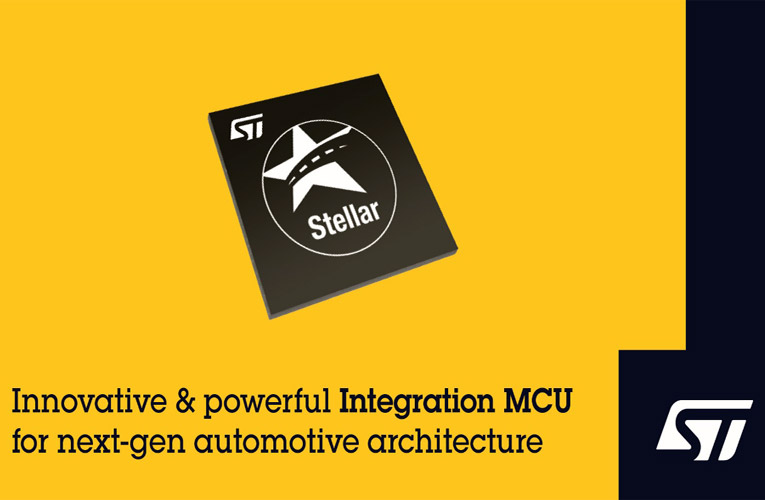
ST jointly with Bosch has developed deterministic high-performance open-market MCUs that can host multiple applications, including virtualization of safety and security by HW functionality. This new approach enables integration of multiple applications developed with different tooling and on different software schedules, in contrast to today’s Linux/Posix-based integration-platform solutions. The Non-volatile Phase-Change Memory (PCM) supports safety by delivering single-bit overwrite capability and has very effective Over-the-Air updates with no downtime
STMicroelectronics has revealed further details of its innovative Stellar automotive microcontrollers (MCUs) to show how the devices ensure the reliable and deterministic execution of multiple independent real-time applications. Pioneering this new class of controllers, Stellar Integration MCUs are designed with exceptional computing power to significantly simplify the concurrent and deterministic execution of multiple-sourced software while guaranteeing the highest levels of safety and performance. These capabilities meet system requirements in the electrics/electronics (E/E) architecture of the next generation of connected cars. To do this, Stellar introduces features that include a state-of-the-art processor with hardware support for virtualization, quality of service settings, the ability to firewall peripherals and perform resource separation at interconnect levels. These features allow independent applications, or Virtual ECUs, to coexist in the same physical MCU by guaranteeing freedom from interference and secure compartmentalization of software functions while supporting concurrent multiple ASIL safety levels.
Stellar embeds multiple Arm® Cortex®-R52 cores - some operating in lockstep and some in Split/Lock – and features a 2-level Memory Protection Unit and a low-latency Generic Interrupt Controller. The MCU is suited to hard real-time applications up to the highest safety integrity level, ASIL-D, specified in the automotive functional safety standard, ISO 26262. There are also multiple powerful accelerators for secure data routing, processing, and mathematical functions, with advanced security support and extensive communication command and control.
The Integration MCU offers comprehensive virtualization at multiple levels using a Virtual Machine ID (VMID) at the network-on-chip and memory levels. Firewalls ensure complete separation at all interconnect levels including the peripherals. These firewalls allow Stellar to manage Virtual Machines (VMs) accesses and privileges to peripherals, ensuring the isolation of entire mission-critical functions.
At the same time, Stellar manages increasing software complexity and integration with better utilization of its hardware resources. This reduces the total overhead of multiple separate ECUs performing their own housekeeping and managing communication-stack-related latency. In fact, Stellar can support several real-time operating systems (OSes) running independently, without interference. These OSes can separately manage applications with different functional-safety levels and superior processing capabilities for encrypted communication over Ethernet or CAN buses with dedicated AES accelerators to offload the main Hardware Security Modules (HSM) for MACSec, IPSec, and CAN authentication.
Stellar Integration MCUs feature non-volatile Phase-Change Memory (PCM), offering fast read access times, and single-bit alterability that is not available in Flash memory. PCM ensures Over-The-Air (OTA) updates with zero downtime, even for full-sized memory updates. In addition to increasing flexibility and erase/write cycles, single-bit alterability at runtime (no erase required) extends safety setup by refreshing bits to eliminate single-bit failures and extend the memory’s lifetime.
ST’s embedded-PCM technology has been developed and tested to operate within the most stringent automotive requirements for robust high-temperature operation, radiation hardening, cycling, and data retention. ePCM achieves automotive requirements for AEC-Q100 Grade 0 with an operating temperature up to +165°C.

